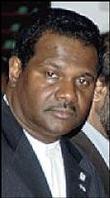Phillip Phinn, Contributor
PHINN
Recent articles in The Gleaner 'Portia, Phinn and Prophecy' and 'A Prophet called Phinn', by Rev. Devon Dick and Mr. Mark Dawes respectively, have turned my life right side up, with phone calls and emails coming from the U.K., Canada, U.S.A., and all over Jamaica. The quest for information re the ministry of the prophet and prophecy, demand more than giving explanation via phone calls and emails.
I therefore, want to thank The Gleaner for giving me an opportunity to address the subject of the ministry of the prophet and prophecy.
THE MINISTRY of the prophet is not a new ministry to the New Testament age. It has its root in the Old Testament. The Bible declares:
"Surely the Lord GOD will do nothing, but he revealeth his secret unto his servants the prophets." (Amos 3:7).
"I have also spoken by the prophets, and I have multiplied visions, and used similitudes, by the ministry of the prophets." (Hosea 12:10).
Who therefore is a prophet?
What is prophecy?
Is this office necessary in the church today?
A prophet is a spokesman for God who sees and knows things supernaturally, "Previously in Israel, when a man went to enquire of God, thus he spoke, Come, let us go to the seer, for he that is now called a prophet was formerly called a seer." (1Samuel 9:9).
Like a pastor or an evangelist, this individual is chosen and called by God to this office. In the Old Testament, several words are used that are translated prophecy. The two main ones are 'raba' which means to bubble up, to gush forth or pour forth; and 'nataf' which means to drop, to fall as drops of rain.
However, in the New Testament the word used is 'propheteuo' which means to say, to speak forth or fore. It is, therefore, apparent that prophecy involves two main aspects:
Foretelling, that is proclaiming beforehand something that will surely take place; and
Forthtelling, that is speaking a message from God. Although all prediction is prophecy, not all prophecy is prediction.
In the New Testament the three main purposes of prophecy are:
Edification
Comfort
Exhortation.
The office of the prophet is the second-highest office in the church and is given by Christ as one of the five-fold ministries. The other offices are apostle, teacher, pastor and evangelist and together they function to mature the saints, equip them for ministry, and edify them and to bring them into unity.
Looking at the church today, we rarely see the ministry of the prophet in operation. However, it is clear from the scripture that this ministry functioned in the New Testament church. There was a period in the history of the church when it experienced decline and deterioration. It faded into obscurity and the structural church began to dominate until the beginning of the reformation. Many things contributed to its apostate condition. Several pagan customs were 'converted' and infiltrated the church as rituals and observances of true Christianity. With this, many of the gifts and offices given to the church to function effectively declined.
But God has not left His people. Gradually the gifts and offices are being restored. Of the five-fold ministries, we have seen the restoration of the pastor, evangelist and teacher but the church still cannot come into full maturity without the ministry of the prophet.
Although the ministry will vary from prophet to prophet, it will involve revelations, exhortations, warnings, the grounding and establishing of churches and the impartation of visions to the people of God. This type of ministry along with the other four ministries, operated in the early church, and from the book of Acts we can see the impact the church had on the Roman Empire.
The Bible declares that they prospered through the prophesying of Haggai, the prophet, and Zechariah the son of Ido, "Believe in the Lord your God so shall ye be established, believe his prophets so shall ye prosper."
Let us, therefore, pray that God will raise up prophets in the church today.
Dr. Phillip Phinn is the senior partner of the Word of Life Christian Fellowship and may be contacted at: wolmi10@yahoo.com.

